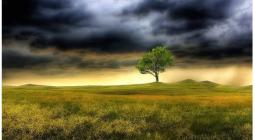‘Two sides of the same coin’: governments stress links between climate and nature collapse
Representatives at the Cop16 summit in Colombia negotiated against a backdrop of extreme weather and ecosystem collapse
As world leaders gathered in Colombia this week, they also watched for news from home, where many of the headlines carried the catastrophic consequences of ecological breakdown. Across the Amazon rainforest and Brazil’s enormous wetlands, relentless fires had burned more than 22m hectares (55m acres). In Spain, the death toll in communities devastated by flooding passed 200. In the boreal forests that span Siberia, Scandinavia, Alaska and Canada, countries were recording alarming signs that their carbon sinks were collapsing under a combined weight of drought, tree death and logging. As Canada’s wildfire season crept to a close, scientists calculated it was the second worst in two decades – behind only last year’s burn, which released more carbon than some of the world’s largest emitting countries.
In global negotiations, climate and nature move along two independent tracks, and for years were broadly treated as distinct challenges. But as negotiations closed at the Cop16 biodiversity summit in Cali on Saturday, ministers from around the world underscored the crucial importance of nature to limiting damage from global heating, and vice versa – emphasising that climate and biodiversity could no longer be treated as independent issues if either crisis was to be resolved. Countries agreed a text on links between the climate and nature, but failed to include language on a phase out of fossil fuels.
The UK environment secretary, Steve Reed, said that attending the summit in Colombia had brought home the links between climate and biodiversity. “One of the other things that’s really struck me coming here and speaking to the Colombians in particular is how for them the nature crisis and the climate crisis are exactly the same thing. In the UK, perhaps more widely in the global north, we tend to talk a lot about climate and particularly net zero, and much less about nature – perhaps because we’re already more nature-depleted. But those two things connect entirely,” he said.
The Cop16 president, Susana Muhamad, Colombia’s environment minister, has sought to put nature on a level with global efforts to decarbonise the world economy during the summit, warning that slashes to greenhouse gas emissions must be accompanied by the protection and restoration of the natural world if they are to be effective. Her presidency has repeatedly described nature and climate as “two sides of the same coin”.
“There is a double movement humanity must make. The first one is to decarbonise and have a just energy transition. The other side of the coin is to restore nature and allow nature to take again its power over planet Earth so that we can really stabilise the climate,” she has said throughout Cop16 and during the buildup.
The shift toward a more intertwined view of climate and biodiversity was also reflected in the negotiations at last year’s Cop28 climate summit in Dubai. Countries agreed to update their next generation round of climate plans in line with their commitments on nature. It comes amid growing scientific concerns about how forests, oceans and other natural carbon sinks are responding to global heating, with new research indicating a collapse in the amount of carbon absorbed by land – as a net category – in 2023, the hottest year on record.
The planet’s oceans, forests, soils and other natural carbon sinks absorb about half of all human emissions, shielding humanity from the full effects of fossil fuel pollution. Without this, warming would rapidly accelerate.
Brazil and the Democratic Republic of Congo, home to enormous areas of the Amazon and Congo basin rainforests respectively, pushed for greater recognition of the climate-stabilising effects of the ecosystems they house, both of which are threatened with destruction.
Ève Bazaiba, DRC’s environment minister, said that her country’s forests helped sustain rainfall as far away as Egypt and were critical to the health of the planet, calling for better international recognition of its importance. Marina Silva, Brazil’s environment minister, who has once again overseen a sharp drop in deforestation under the presidency of Luiz Inácio Lula da Silva, said that more money for forested countries was required.
“Brazil has a commitment to zero deforestation by 2030. We know that the reasons why biodiversity is destroyed have to do with several factors, one of which is certainly overwhelmingly the issue of deforestation. Another that is closely associated with the serious problem of climate change that is destructive to our biodiversity.
Smaller forested countries were also keen to underscore the importance of natural ecosystems to mitigating climate breakdown. Jiwoh Abdulai, the environment and climate change minister of Sierra Leone, said he was concerned that land sinks had absorbed less carbon in 2023. “That’s why we’re here. We have these assets which are essentially globally critical infrastructure,” he said.
The degradation of forests is already affecting rural communities that depend on rain-based agriculture as weather patterns are no longer predictable, resulting in lower yields, a drop in income and more food insecurity. As land becomes less fertile, people are increasingly encroaching into the forest.
Abdulai added: “Our countries host these forests. Our local communities are the custodians, but the benefits of having these forests are shared globally.”
Others were concerned that the loss of their forests could undermine climate progress. In Nigeria there has been a 13% decrease in forest cover since 2000. “The rate of forest loss in Nigeria is one of the highest in the world,” said the country’s environment minister, Iziaq Kunle Salako.
He added: “The role that forests need to play in net zero targets is particularly significant. If you look at the UN convention on climate change, on biodiversity, and on desertification, the forest is central. So this is an area that is very, very concerning in Nigeria.
“If the forest is not sequestering [carbon], it’s not playing the primary role it has to play, and it will be challenging for the world to reach the target of zero emissions.”
Cover photo: Scientists calculated that Canada’s wildfire season, now coming to a close, was the second worse in 20 years. Photograph: BC Wildfire Service/AFP/Getty Images




